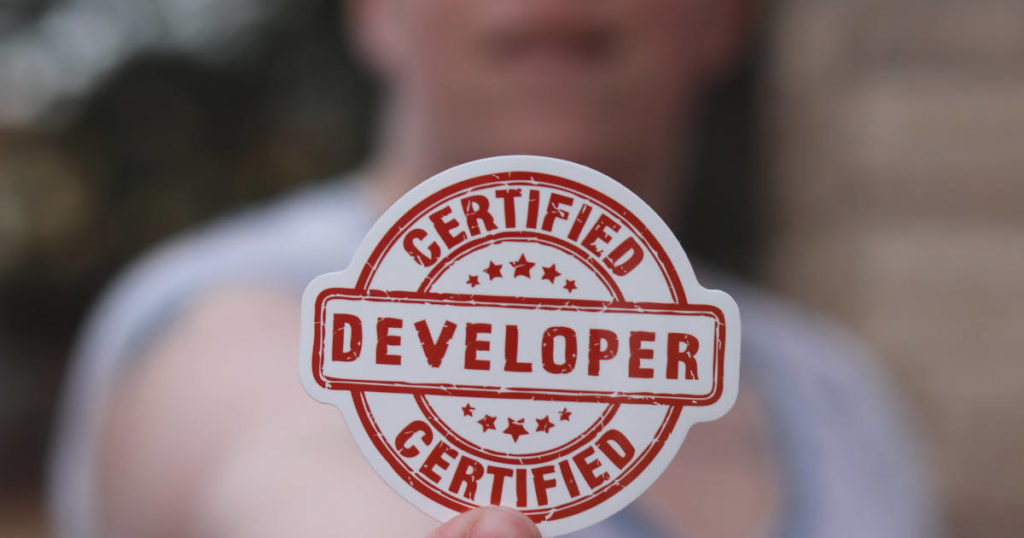As Salesforce’s ecosystem expands, pulling in over 150,000 customers globally (with 90% of Fortune 500 companies using Salesforce to maintain lasting relationships with their customers), the need for skilled professionals certified in Salesforce grows.
This is where Salesforce certifications come in. Becoming Salesforce-certified allows you to show recruiters and employers that you know how to apply your Salesforce skills to real-world challenges.
As such, getting a Salesforce certification can be the perfect solution if you want to improve your resume, stand out from your peers, and grow your career. With that in mind, let’s look at how you can get Salesforce certified in more detail.
Table of Contents
ToggleWhat are Certifications in Salesforce?
Salesforce certifications are globally-recognized credentials that show you have the qualifications, skills, and hands-on experience with Salesforce. When seeing them on your resume, employers will immediately know that you understand how to implement the platform’s best practices in any situation.
What Certifications Does Salesforce Offer?
Salesforce offers a range of certifications, depending on your specific job function or where you want to strengthen your skills. So, when choosing a certification, you can consider:
- Salesforce Administrator Certifications. As a Salesforce Administrator, you’ll work with organizations to define their requirements, customize the platform based on these requirements, and, ultimately, help them get the most out of the platform. Some examples of these certifications include Administrator, Advanced Administrator, and Business Analyst. This is a highly-technical Salesforce certification, but we’ve seen Salesforce administrator job ads increase; it’s becoming a viable career option.
- Salesforce Architect Certifications. As a Salesforce Architect, you’ll design personalized, high-performance solutions on the Salesforce platform and, in the process, help organizations solve their challenges and serve their customers better. Some examples of these certifications include Application Architect, System Architect, Technical Architect, and Solution Architect.
- Salesforce Developer Certifications. As a Salesforce Developer, you’ll use your coding skills to customize applications and extend their functionality on the Salesforce Lightning platform for your organization. Some Developer certifications include Platform App Builder, Platform Developer, B2C Commerce Developer, and Marketing Cloud Developer.
- Salesforce Marketer Certifications. Salesforce Marketers use Salesforce data to create targeted, effective marketing campaigns that utilize Salesforce data to attract new customers, connect with them, and deliver stellar customer experiences. Salesforce’s marketing certifications include Marketing Cloud Administrator, Marketing Cloud Consultant, Marketing Cloud Email Specialist, and Pardot Specialist. If you’ve chosen marketing as your career path, many of the organizations where you apply for a position will require you to understand Salesforce, so it’s a good certification to add to your resume.
- Salesforce Consultant Certifications. Like Administrators, Salesforce Consultants work with organizations to define their unique requirements and customize the Salesforce platform based on their needs. As such, they help organizations get the most value out of the Salesforce platform. In addition to building, Consultants in Salesforce analyze. We hold a vast amount of data in Salesforce, with many organizations using it as their central HQ, so Salesforce Consultants need to be able to extract strategic insights. Salesforce’s Consultant certifications include Business Analyst, Experience Cloud Consultant, Marketing Cloud Consultant, Sales Cloud Consultant, and Service Cloud Consultant.
- Salesforce Designer Certifications. As a Salesforce Designer, you’ll design solutions on the Salesforce platform that help organizations create exceptional user experiences that help them drive business outcomes. Salesforce is an endlessly expanding ecosystem (especially with the AppExchange apps), so it’s necessary to continuously optimize the user experience. The current certifications offered by Salesforce are User Experience Designer and Strategy Designer.
How Much Do Salesforce Certifications Cost?
Regarding the costs of Salesforce certifications, the costs for registering for the exam generally range between $200 and $400, depending on the certification. Similarly, the costs for retaking the exams vary between $100 and $200.
There’s one exception, though. The Salesforce Technical Architect certification costs $4,500 to register for the exam and $2,250 to retake the exam.

Apart from allowing you to take the exam, these costs also include resources like interactive study tools, a list of relevant learning modules, and a guide that outlines the topics covered in the test. It’s also important to remember that for some certifications, you’ll first need to complete others as a prerequisite. In this case, you’ll need to register for each exam separately.
Why Should You Consider Getting Certified in Salesforce?
Salesforce-Certified Professionals Are in High Demand
We mentioned earlier that Salesforce now has 150,000 customers around the world. This simply means that there is no shortage of demand, and many organizations are actively seeking candidates with Salesforce skills and expertise. In fact, as of August 2022, there were no less than 106,000 job listings for people with Salesforce certifications or experience in using the software. And that’s only in the US.
If you’re in marketing, customer experience, or sales, you’ll have to use Salesforce at some point. Even if you’re not customer-facing, Salesforce is constantly expanding. At best, you’ll need to know how to extract Salesforce customer data for your job-related tasks.
Develop Your Salesforce Skills
When you get certified and maintain your certification, you’ll ensure that your skills are always up-to-date. In the process, you’ll learn how to effectively use all the platform features and develop new skills which you might not have as a standard Salesforce user.
Developing your Salesforce skills (even if they’re not necessary for the job you’re applying for) also shows your potential employers that you’re staying updated on new tech and want to improve your knowledge.
Improve Your Job Performance with Salesforce Certifications
When you apply the new skills you’ve learned and use Salesforce’s features more effectively, you’ll improve your job performance. You’ll be able to start and complete projects faster, find better solutions to problems and be more productive and effective. Instead of having to ping the Salesforce admin for everything, you’ll be able to fix minor issues on your own.

Unlock New Opportunities
We mentioned earlier that people with Salesforce skills are in high demand. As such, you won’t struggle much if your goal with certification is to find a new job. However, besides finding a new job, Salesforce certification can also be a springboard for promotions into roles with more responsibility at your current job. For example, most sales and marketing managers need to be able to use and customize Salesforce to monitor their teams effectively.
Higher Income
Simply put, when you’re qualified for a position that is in high demand, and you’re able to provide value to an organization because of your Salesforce certifications, you’ll set yourself up to earn more. As a result, you’ll be able to earn a competitive salary.
How to Get Certified in Saleforce
Step 1: Choose a Salesforce Certification
The first step is choosing a certification. Consider your role, what skills you want to develop, and what you want to achieve. Then, look at the available Salesforce certifications to find the one that best meets your needs.
During this process, you’ll learn what skills the different certifications will teach you. You’ll also see what enrollment prerequisites or requirements the certifications have.
Step 2: Register for the Exam
Once you’ve decided on a certification, you’ll need to register for it. To do this, you’ll first need to register for a Webassessor account, enabling you to schedule the exam and pay the registration fee. Before registering, though, it’s important that you first confirm the pricing of the certification. This is also a great time to familiarize yourself with the exam process and its requirements.
Step 3: Prepare for the Exam
Once you’ve registered for and scheduled the exam, you’ll know when you’ll need to take the exam. Now comes the time to prepare for it and learn as much as possible. Ultimately, it’s your preparation that will determine your success.
Fortunately, there are many resources out there you can use to prepare. These include:
- Blogs. Unsurprisingly, there are many blogs available on the internet that provide valuable Salesforce content. These blogs can not only help you prepare for your exam but also keep your knowledge up to date.
- Books. Books allow you to delve deeper into topics compared to blogs. As such, they help provide you with a more complete understanding of the subject matter of the exam.
- Online courses. As an alternative to books or even in combination with them, online courses can be invaluable in helping you understand complex topics. Another benefit of these courses is that they’re often cheap and easily accessible.
- Salesforce’s resources. Finally, you can also use Salesforce’s extensive library of learning materials to prepare. These include Trailhead Academy, training webinars, and more.
Step 4: Take the Exam
The next step is to take the exam. Make sure that you’re well-prepared and that you arrive on time, no matter if you’re taking the exam on-site or online.

Step 5: Maintain Your Certification
Finally, once you’ve passed the exam, it’s important to remember that you’ll have to maintain your certification. If you don’t, the certification will expire, and you’ll need to take the exam again. To maintain your certification, you’ll complete one maintenance model per year and stay updated on when new maintenance modules become available.
It’s Time You Got Certified in Salesforce!
If you’re looking for a new job, a promotion to a position with more responsibility, want to earn more money, and grow your career, Salesforce certifications are priceless. They allow you to effectively demonstrate your Salesforce skills, expertise, and experience to any organization. Give your career a boost with the right Salesforce certification!

